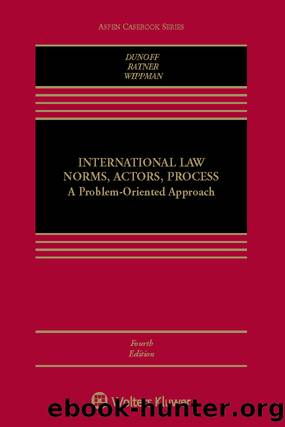INTERNATIONAL LAW NORMS, ACTORS, PROCESS by Jeffrey L. Dunoff Steven R. Ratner David Wippman

Author:Jeffrey L. Dunoff, Steven R. Ratner, David Wippman
Language: eng
Format: epub
Publisher: Aspen Publisher
Published: 2012-11-15T00:00:00+00:00
Israel had dedicated significant resources to investigating over 400 allegations of operational misconduct in Gaza, but ⦠[t]here was no indication that Israel had opened investigations into the actions of those who designed, planned, ordered and oversaw Operation Cast Lead as called for by the [Goldstone] Fact-Finding Mission report.
The Committee noted further that only three of the Gaza investigations had produced convictions. The Committee described the investigation conducted by the Palestinian authority as âcredible and genuine,â but added, â[n]onetheless, the Committee is concerned that criminal accountability mechanisms have not yet been duly activated in relation to many of the allegations of serious violations in the FFM report.â With regard to the âde facto authoritiesâ in Gaza (i.e., Hamas), the Committee concluded that they âhave not conducted any investigations into the launching of rocket and mortar attacks against Israel.â
On April 2011, Goldstone published an op-ed in the Washington Post, stating that â[i]f I had known then what I know now, the Goldstone Report would have been a different document.â In particular, Goldstone stated that Israeli investigations following the Report âindicate that civilians were not intentionally targeted as a matter of policy.â Goldstone reiterated concerns about the slow pace of Israel's inquiries and its lack of cooperation with his investigation; however, noting that his report's main recommendation was for transparent, good faith investigations, Goldstone argued that the McGowan Davis Report found Israel had complied with that recommendation âto a significant degree,â while âHamas has done nothing.â Critics challenged Goldstone's reading of the McGowan Davis Report and suggested no new information had surfaced to warrant a rethinking of the Goldstone Report.
In July 2014, following further rocket fire from Gaza into Israel, Israel launched Operation Protective Edge, a seven-week military campaign in Gaza that left over 2,000 dead and much of Gaza's infrastructure in ruins. In July 2014, the UN Human Rights Council appointed a new panel to investigate violations of international humanitarian law during the conflict. Israel denounced the panel as a âkangaroo courtâ and announced it would conduct its own investigation.
457
Israeli shelling of UN facilities, including some schools, elicited sharp international condemnation. Israel blamed Hamas for deliberately launching attacks from or near civilian facilities, a claim that was supported in part when the UN Relief and Works Agency (UNRWA) announced that it had discovered rockets stored in several of its schools. As Human Rights Watch pointed out, however, the schools in which the rockets were found were not the ones in which there were large civilian casualties. In November 2014, the UN Secretary-General announced the formation of âan internal and independent United Nations Headquarters Board of Inquiryâ to look into attacks on its facilities in Gaza during the 2014 conflict.
Israel's periodic conflicts with Palestinians in Gaza raise the question whether either side in an asymmetric conflict can comply with the laws of war and still win. As the philosopher Michael Walzer has observed,
Download
This site does not store any files on its server. We only index and link to content provided by other sites. Please contact the content providers to delete copyright contents if any and email us, we'll remove relevant links or contents immediately.
The Rule of Law by Bingham Tom(1318)
The Holocaust: A New History by Laurence Rees(1235)
Political Theology by Carl Schmitt(1187)
The Social Animal by David Brooks(1116)
Pirates of Somalia by Jay Bahadur(1115)
Restitution by Restitution(1113)
A Practical Guide to International Arbitration in London by Hilary Heilbron(1081)
Coercing Virtue by Robert H. Bork(1025)
The Nuremberg Interviews by Leon Goldensohn(987)
Basic International Corporate Taxation by Sebastiano Garufi(928)
A History Of Thailand by Baker Chris(889)
Asian Waters by Humphrey Hawksley(877)
International Trade and Business: Law, Policy and Ethics by Gabriël Moens & Peter Gillies(868)
Blood Profits by Vanessa Neumann(867)
Spring Fever: The Illusion of Islamic Democracy by McCarthy Andrew C(866)
The Global Commons by Susan J. Buck(863)
Crimes Against Humanity: Historical Evolution and Contemporary Application by M. Cherif Bassiouni(793)
The Sovereignty of Human Rights by Macklem Patrick(792)
The Nuremberg Trials: The Nazis and their Crimes Against Humanity by Roland Paul(789)
